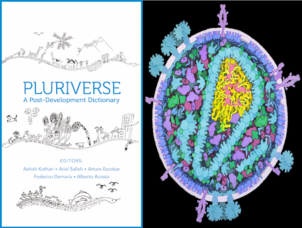
The novel coronavirus pandemic is taking a toll on all of us -especially those who have died, those needing urgent care, and those least able to retreat into their homes until the worst is over.
But, beyond the health and humanitarian measures urgently needed for those affected, it also offers a chance to right historical wrongs – the abuse of our earthly home and of marginalised societies, the very people who will suffer most from this pandemic.
This viral outbreak is a sign that by going too far in exploiting the rest of nature, the dominant globalising culture has undone the planet’s capacity to sustain life and livelihoods.
Polity
The unleashing of micro-organisms from their animal hosts means that they must latch on to other bodies for their own survival. Humans are a part of nature – and everything is connected to everything else.
The current pandemic is just one aspect of the human-made planetary crisis known as the Anthropocene; runaway climate change and biodiversity loss are others – and all are connected. COVID-19 confronts us with a civilizational crisis so immediate and so severe, that the only real strategy will be one that can reach into and heal the web of life.
The Nigerian philosopher Bayo Akomolafe comments that the complexity of our human situation today almost defies thinkability and framing. This crisis strips away all delusional confidence in modern world notions of history, progress, humanity, knowledge, time, secularism, and our tendency to take life itself for granted.
It should also caution us against responses that strip away democratic and human rights, as is happening in the name of controlling the virus in many countries, for such responses only further reduce the ability of citizens to deal with such crises.
The coronavirus crisis signifies a civilization that is dying, but also, it shows a pluriverse of ‘other worlds’ rising up. Every crisis is an opportunity. The key question is how to remake our economy and polity in a way that respects ecological limits and works for all humanity.
Production
The answer must go beyond superficial managerial and technological fixes to deep systemic transformations that can shake up structural injustices, unsustainability, and de-futuring. We need a dramatic shift towards genuine democracy; one that places confidence in the time-tested genius of local communities and collectives.
We challenge the old eurocentric mode of existence based on separation of humans from other natural entities – us versus them, mind versus body, secular versus spiritual.
By denying the essential interdependence of everything on Earth, this dualist way of thinking and being simply served to entrench the domination of masculine power over life-affirming feminine care. It paved the way for the most objectifying and harmful economy humanity has ever seen, today enshrined in a heavily militarised global neoliberal capitalist (dis)order.
The pandemic is bringing home new lessons. Economic globalization has not brought universal prosperity but ecological devastation, social disruption and inequality. So now, on every continent, we see thinkers and activists setting out to replace the capitalist regime with re-communalization, striving for self-reliance, even welcoming refugees and others in need, as has happened in Greece in some cases.
Against terms dictated by the WTO and multinational corporations, this move to human scale production lets people design their own livelihoods in ways that protect habitat.
Radical
Relocalisation may even reverse the desperate flow of rural migration to cities, where population density spreads diseases like novel coronavirus so easily.
Is this only a pipe-dream? No. Looking around the world, we see thousands of culturally diverse initiatives for food, energy, water, and other forms of community sovereignty. Such localised solutions give back meaning, identity, dignity, and sufficiency to people who have been alienated by a century of so-called progress, under corporate and state centralized power.
The grassroots revolution marks a shift from the precarious economy of derivatives and share markets, into a real economy of making needed goods, giving and sharing ‘services’. It speaks a vision of autonomous bio-cultural regions, defined by tangible social and ecological relationships, and making tangible the argument that mutual aid and local ecosystem protection are more effective for dealing with crises and even pandemics than centralized statist measures.
As against neoliberal privatisation, here land and water, ideas and knowledge, are honoured as commons. This future implies degrowth, a respect for limits, a reduction and fair redistribution of materials and energy on the planet.
Across the globe today there is a re-birth of radical democracy, often led by women or by youth, whose energies ‘for life’ combine with social movements for the liberation of species, genders, castes, and oppressed class groupings.
Promises
Our book Pluriverse: A Post-development Dictionary collects together a multitude of such transformative alternatives. There are indigenous re-assertions of harmony with the Earth in buen vivir and ubuntu; new notions emerging from broken industrial contexts like ecofeminism and degrowth; practical networks for agroecology and free software; and dozens of others.
The book draws a sharp contrast between such deep structural shifts and ‘reformist solutions’ that assume One Globalized World pre-coded by Western values, and mobilised by the futile logic of growth. What emerges is a living language for the wealth and diversity of people’s knowledges and practices attuned to planetary wellbeing.
This lexicon is building a Global Tapestry of Alternatives; it offers a collaborative space for activists weaving together transformative initiatives across the world; it becomes a new horizon for being and doing.
The coronavirus pandemic ends a universe of false promises. The pluriverse announces new hope for radical democracy that includes all of life – ‘a world where many worlds fit’.
Authors
Ashish Kothari, Ariel Salleh, Federico Demaria, Arturo Escobar, and Alberto Acosta are the editors of Pluriverse: A Post-Development Dictionary.
This article was first published at Open Democracy

The project ENVJUSTICE has received funding from the European Research Council (ERC) under the European Union’s Horizon 2020 research and innovation programme (grant agreement No. 695446)